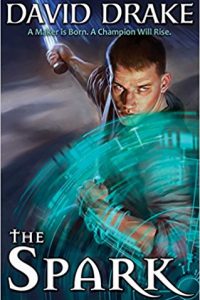Faren Miller reviews Terry Pratchett
 Over the course of Terry Pratchett’s long career in humorous fantasy, the City Watch of Ankh-Morpork has gone through its own changes, rarely as slapstick as the titles of books like Thud! and now the equally-monosyllabic Snuff might suggest. The traditional hatreds between dwarves and trolls, werewolves and vampires, etc., don’t immediately die down when they come together in the supposed melting-pot of urban life, any more than English and Irish, or rich and poor, come to view enmity as old-hat in Victorian London. And only the most starry-eyed idealist would expect things to be better in the countryside.
Over the course of Terry Pratchett’s long career in humorous fantasy, the City Watch of Ankh-Morpork has gone through its own changes, rarely as slapstick as the titles of books like Thud! and now the equally-monosyllabic Snuff might suggest. The traditional hatreds between dwarves and trolls, werewolves and vampires, etc., don’t immediately die down when they come together in the supposed melting-pot of urban life, any more than English and Irish, or rich and poor, come to view enmity as old-hat in Victorian London. And only the most starry-eyed idealist would expect things to be better in the countryside.
Samuel Vimes, still head of the Watch despite the marriage to Lady Sybil that brought him wealth and social status as well as true love, grew up a street kid with very little patience for ideals of any kind. While his wife has lovely memories of fun outdoors, ‘‘climbing trees and swimming and fishing in the river, and picking flowers… and similarly jolly rural enterprises,’’ in his recollection, ‘‘You could fish in the River Ankh, provided that you took care not to catch anything. In fact it was amazing what you could catch by just letting one drop of the Ankh pass your lips.’’ In Snuff he is supposed to be enjoying the idleness of a family holiday on her estate, though he mistrusts leisure. But how can he put his instincts as a city cop to use amid all this unfamiliar greenery, herds of tame animals, and mysterious bursts of birdsong?
Thanks to the more adaptive nature and flaming passions of youth, his son Young Sam takes to the fields and woods almost immediately, developing a fascination with their many varieties of ‘‘poo’’ with help from a guidebook by a local lady author who keeps showing up in unexpected places, most notably a goblin cave. Unlike the urban terrorists in the Brennan novel, the goblins here are generally shy and retiring, though still loathed by humans – not just for stealing the occasional chicken but also for their reeking bodies.
Only the rare scholarly, unprejudiced human like the local authoress knows about goblins’ peculiar obsession with many of their bodily excretions and secretions, basis of a religion which requires the making of various (exquisite) containers to preserve these relics. Nonetheless, one container makes its way to Ankh-Morpork and into the life of a member of the Watch, for a subplot that will eventually tie into Vimes’s discoveries about good and evil as practiced in the Sticks. (As for the book’s title, it isn’t slang for a killing, though one plot thread does include something like mass murder.)
While not officially YA, Snuff revels in jokes about snot, poo, and pee to an extent that should delight most boys, exasperate the more finicky sort of girls, and dismay some grannies (if their last name’s not Weatherwax). But it’s all in good fun, and – along with the increasingly fast-paced, perilous adventures that sweep up Vimes once he catches the attention of a true villain – it helps keep the novel’s elements of tragedy from diverting Entertainment to the solemn service of Message.







